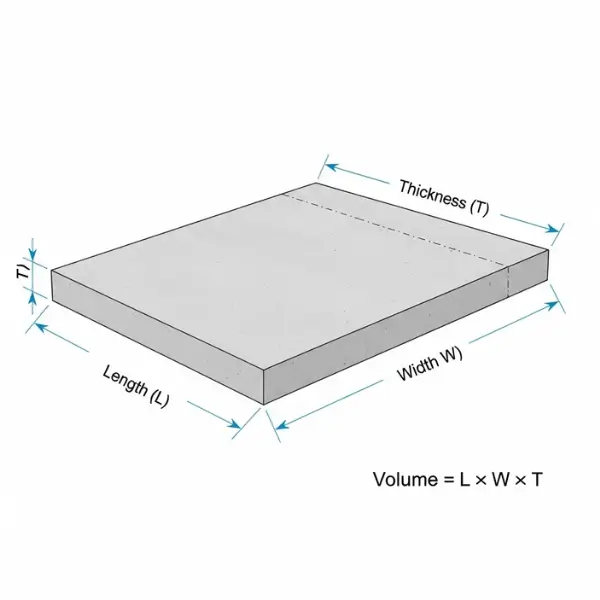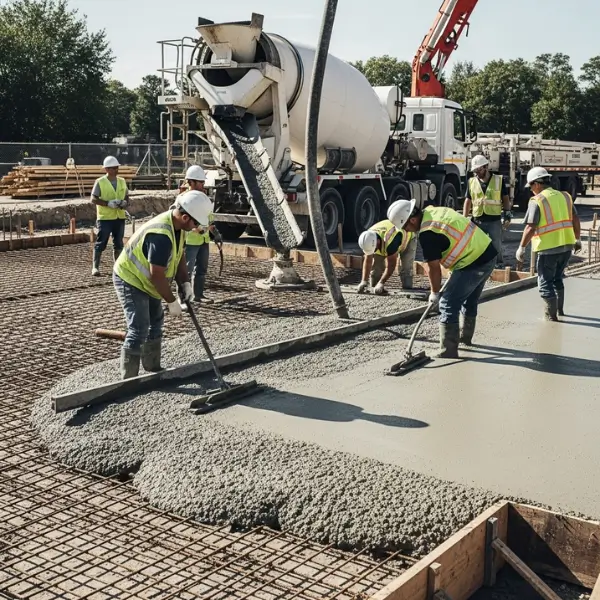Phone:
(701)814-6992
Physical address:
6296 Donnelly Plaza
Ratkeville, Bahamas.
Estimate the volume of concrete needed for your slab in cubic yards and bags.
0 yd³
Cubic Feet
0 ft³
80lb Bags Needed
0
Your feedback helps us build better tools.
A Slab Volume Calculator is a tool that helps you determine the amount of concrete needed for a rectangular slab. By entering the length, width, and thickness of your slab, it instantly calculates the total volume in cubic feet, cubic yards (the standard unit for ordering ready-mix concrete), and an estimate of how many pre-mixed bags you'll need.
Follow these simple steps for an accurate concrete estimate.
Measure the length and width of your slab area in feet, and the desired thickness in inches.
Convert the thickness from inches to feet by dividing by 12. This ensures all units are the same.
Multiply Length × Width × Thickness (in feet) to get the volume in cubic feet. Divide by 27 for cubic yards.
Enter your slab's length and width in feet, and its thickness in inches. Accuracy is key.
Press the "Calculate" button to process your dimensions and see the results instantly.
Receive a detailed breakdown of the concrete volume in cubic yards, cubic feet, and the number of bags needed.
These are the fundamental formulas our calculator uses to determine the volume of your concrete slab.


Accurately calculating the volume of concrete needed is the most critical step in planning any slab project. Ordering too little results in costly delays and can create a "cold joint"—a weak spot in your slab. Ordering too much leads to wasted material and disposal fees. A quick calculation up front saves time, money, and ensures a strong, professional result.
Calculate Your Slab VolumeCubic yards are the standard unit of measurement for ordering ready-mix concrete delivered by a truck. There are 27 cubic feet in one cubic yard. While you measure your project in feet, you order the concrete in yards.
This calculator bases the estimate on standard 80 lb. bags of concrete mix, which typically yield about 0.60 cubic feet of concrete. The number is rounded up to the nearest whole bag. Always check the yield printed on the specific brand of concrete bags you purchase, as it can vary slightly.
Yes, it's always a good idea to order about 10% extra concrete to account for uneven subgrade, spills, and form deflection. Running out of concrete before the job is finished is a major problem, so having a buffer is critical. Our calculator does not include this overage, so you should add it to the final volume.
A 4-inch thickness is standard for most residential projects like patios, sidewalks, and shed foundations. For driveways or slabs that will support heavier loads like large vehicles, a thickness of 5 to 6 inches is recommended for added strength and durability.
While this calculator doesn't account for reinforcement, it is highly recommended for most slabs. Rebar or wire mesh adds tensile strength, helping to control cracking and increase the overall durability of the concrete. The specific type and spacing will depend on your project and local building codes.
Pre-mixed bags are ideal for very small projects, like setting a fence post or a small pad for an AC unit. For anything larger than a few cubic feet, mixing bags becomes very labor-intensive. If your project requires 1 cubic yard or more, ordering ready-mix concrete from a truck is almost always more efficient and cost-effective.
See why our calculator is a go-to tool for concrete projects.
Alistair Finch
Concrete Contractor
"I use this on every job site to confirm my numbers before ordering a truck. Hasn't been wrong yet. Essential tool."
Bronwyn Rhys
DIY Homeowner
"I used this for my back patio slab and it was a lifesaver. The bag estimate was perfect for my trip to the hardware store."
Cassian Valerius
General Contractor
"Quickly gives me the numbers my crew needs on site. Reduces errors and saves time. A must-have."
Elara Vance
Landscape Architect
"Great for planning out backyard patios and walkways for clients. Helps me quickly create a budget."
Peregrine Thorne
Property Manager
"I manage several rental units, and this calculator is essential for estimating flooring costs for turnover. Simple and very accurate."
Isolde Beaumont
Retail Store Owner
"Used this for budgeting the new flooring for my boutique. The estimate was incredibly close to my final cost."
Theron Petrov
Construction Manager
"Great for quickly estimating material needs for bidding on jobs. Simple, fast, and reliable."
Seraphina Dubois
Remodeler
"This calculator is so simple, but it saved me a couple hundred dollars by making sure I included a waste factor. Highly recommend."
Leander Croft
Handyman
"Does exactly what it says. Would be cool to see a feature that helps calculate costs for removing old flooring."
We'd love to hear from you! If you have suggestions, questions, or just want to say hello, please get in touch.